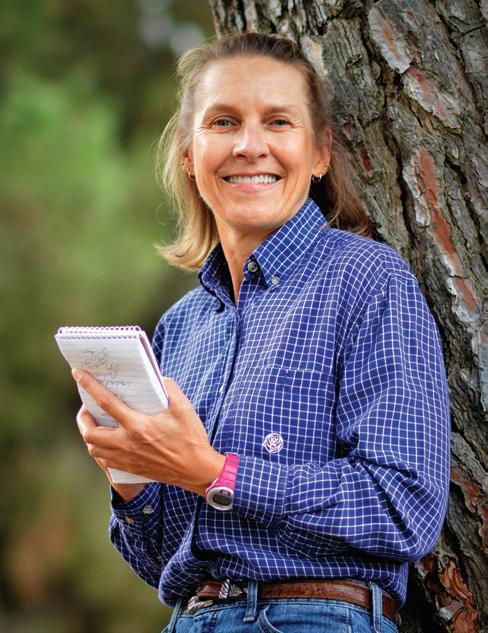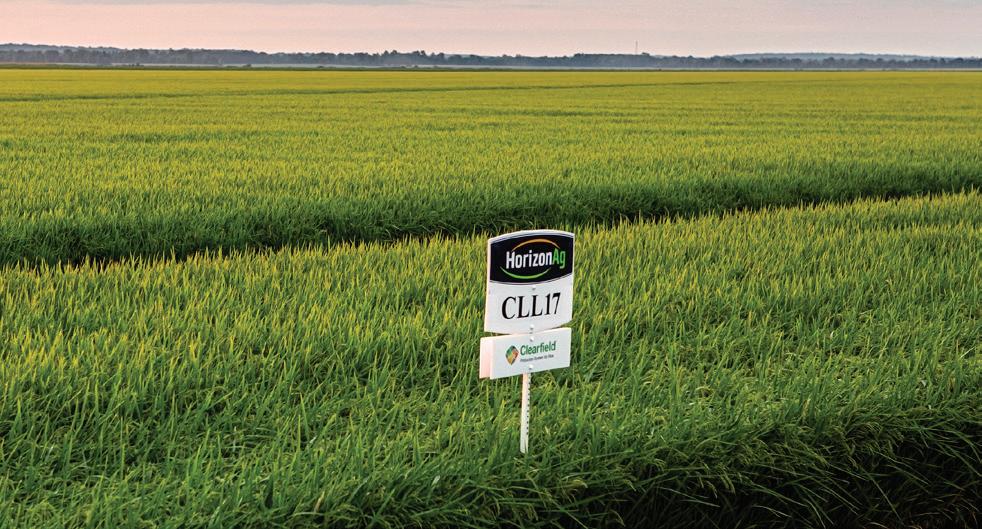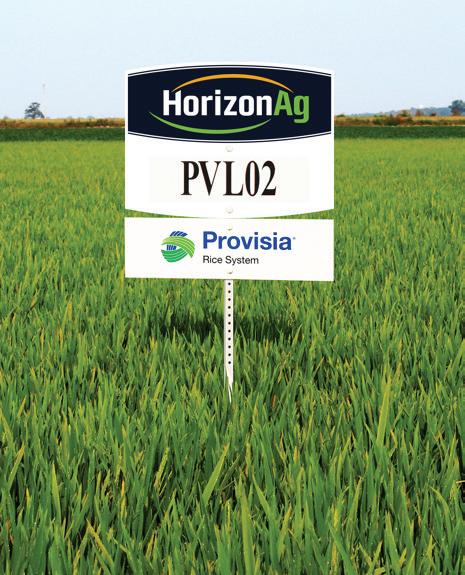
7 minute read
From the Editor
‘Semper Gumby’ took on new meaning in 2020
The Marines have a motto, “Semper fidelis,” which means always faithful or always loyal. A twist on that is “Semper Gumby,” the motto of Marine parents that means always flexible, according to a former coworker whose son served. Considering the strange twists and turns this year has taken, those Marine parents may be onto something.
Farming has always required flexibility with unpredictable weather, pest pressures and market swings. But 2020, with the coronavirus pandemic, followed by hurricanes and wildfire smoke, has been one of those years that demands another level of flexibility. Vicky Boyd
The downhill slide began in mid-March, when Editor coronavirus breached our shores, causing an almost-overnight shutdown of restaurants and other public gatherings. Food suppliers had to pivot as food service typically purchases in bulk, not the 1- or 2-pound bags that consumers buy. A mill set up to ship to industrial users can’t just switch to consumer packaging. They have to order smaller bags, ensure they have a home for that bagged rice and have trucks to haul the packages to grocery distribution centers.
At the same time, the public began panic buying at grocery stores, not knowing what the quarantine would bring. Before the pandemic, 51% of each food dollar was spent on food away from home. In a matter of days, 95-plus percent of meals were being prepared at home. Rice, being a shelf stable, easy to cook comfort food, was in demand. In fact, it was one of the top 10 sales gainers since the pandemic began this spring, according to the trade magazine Supermarket News.
Although the nation wasn’t close to running out of rice during the early weeks of the pandemic, bare grocery store shelves told another story. The hiccups in the supply chain seem to have smoothed out, and empty shelves of rice currently are the exception rather than the norm.
Then hurricanes came ashore along the Texas-Louisiana border this summer and early fall, causing catastrophic damage along the Gulf. Most Southwest Louisiana producers had harvested their first crop of rice before Hurricane Laura hit. But the accompanying strong winds ripped tops off grain bins and knocked down power lines, leaving growers without the electricity needed to power fans on bins to dry the crop. Then Hurricane Delta struck as the ratoon crop was nearing harvest, yanking kernels off panicles and leaving bare stems standing.
California producers faced their own challenges this summer as smoke from north-state wildfires blanketed the Sacramento Valley in September, reducing temperatures and sunlight. Some days, air quality was so bad that the Environmental Protection Agency recommended no outdoor activity. Although the smoke delayed drydown and harvest, it was late enough in the season that it didn’t affect pollination and yields like it did in 2018.
As 2020 winds down, it can’t end soon enough. Happy holidays, and let’s hope that bendable green toy from yesteryear heads back to the toybox in 2021 where it belongs.
EDITORIAL/PRODUCTION
Editor Vicky Boyd 209-505-3612 vlboyd@onegrower.com
Copy Editor Amanda Huber ahuber@onegrower.com
Art Director Ashley Kumpe akumpe@onegrower.com
ADMINISTRATION
Publisher/Vice President Lia Guthrie 901-497-3689 lguthrie@onegrower.com
Associate Publisher Carroll Smith 901-326-4443 csmith@onegrower.com
Sales Manager Scott Emerson 386-462-1532 semerson@onegrower.com
Production Manager Kathy Killingsworth 901-767-4020 kkillingsworth@onegrower.com
Audience Services Kate Thomas 847-559-7514
For subscription changes or change of address, call 847-559-7578 or email ricefarming@omeda.com
ONE GROWER
PUBLISHING, LLC
Mike Lamensdorf President/Treasurer Lia Guthrie Publisher/Vice President
ASSOCIATED PUBLICATIONS — One Grower Publishing LLC also publishes COTTON FARMING, THE PEANUT GROWER, SOYBEAN SOUTH and CORN SOUTH magazines. RICE FARMING (ISSN 0194-0929) is published monthly January through May, and Decem ber, by One Grower Publishing LLC, 875 W. Poplar Ave., Suite 23, Box 305, Collierville, TN 38017. Period icals postage paid at Memphis, Tennesee, and at additional mailing offices. POSTMASTER: Send address changes to
OMEDA COMMUNICATIONS, CUSTOMER SERVICE DEPARTMENT, P.O. BOX 1388, NORTHBROOK,
IL 60065-1388. Annual subscriptions are $25.00. International rates are $55.00 Canada/Mexico, $90.00 all other countries for Air-Speeded Delivery. (Surface delivery not available due to problems in reliability.) $5.00 single copy.
All statements, including product claims, are those of the person or organization making the statement or claim. The publisher does not adopt any such statement or claims as its own and any such statement or claim does not necessarily reflect the opinion of the publisher. RICE FARMING is a registered trademark of One Grower Publishing LLC, which reserves all rights granted by the U.S. Patent and Trademark Office in association with its registration.
© Copyright 2020
One Grower Publishing, LLC 875 W. Poplar Ave., Suite 23, Box 305, Collierville, TN 38017 Phone: 901-767-4020
New Horizon Ag Rice Varieties Improve Performance, ROI
With new Clearfield® rice varieties that challenge hybrid yields at a lower cost than hybrid seed, and the latest Provisia® variety to control weedy rice and herbicide-resistant red rice, Horizon Ag varieties are uniquely positioned to help rice producers improve performance and their bottom line in 2021. “Rice farmers have a lot to consider when it comes to planting next season,” said Dr. Tim Walker, Horizon Ag general manager. “They need to get the best value for their inputs, in terms of price and performance, and they want to have the confidence they are using proven technologies, developed by industry leaders and extensively tested, versus ones claiming to be new that are actually just generic-type products.” New from Horizon Ag for 2021 is CLL16, a long grain Clearfield rice variety developed by the University of Arkansas System Division of Agriculture. CLL16 has shown excellent rough rice yields, averaging higher than Diamond in university tests. Its consistency, quality potential and blast resistance make CLL16 the complete package.
Stoddard County, Missouri, farmer Zack Tanner had CLL16 in his seed production fields in 2020 and saw the outstanding potential of the new variety. “CLL16 is hands down my favorite Clearfield variety, ever,” said Tanner. “It had good vigor, is a medium-season variety that made a very good yield, and the milling was great as well. We didn’t see any blast in it, it didn’t have any lodging, and it does well at a low seeding rate.” He noted that his CLL16 last season cut 204 bushels per acre, dry, without the levees being seeded. In 2019, Tanner’s CLL16 made over 240 dry bushels per acre. “That consistency is really important to farmers,” he said. “It’s a typical Arkansas-plant type and is absolutely a good fit in Missouri and Arkansas.” Another new Horizon Ag variety, CLL17, is an early-season, semi-dwarf long grain rice developed at the LSU Ag Center H. Rouse Caffey Rice Research Station. It consistently out-yielded CL153, the top-planted Louisiana variety in recent years, in multi-year trials, and it has solid ratoon crop potential and also features resistance to blast. In addition, it has proven to provide excellent milling yield and very good grain quality. Winston Frey, who grows certified seed for Horizon Ag near Eunice, Louisiana, had 220 acres of CLL17 this past season and was very impressed by its performance. “All in all, it was awfully good,” said Frey. “I was very pleased with it. It was only one year but we didn’t see disease in it at all. It harvested well, and the milling was very good. I’ve got no complaints with CLL17.” In fact, he’s planning on planting more of the variety in 2021, replacing other varieties that have traditionally performed well but don’t have the total package of high yields and blast resistance. “I think it’s a variety that has the potential to be planted on a lot of acres in the future,” said Frey. “That disease package is real important in this area and is the primary reason behind the shift to CLL17. It’s a major game changer.” These new varieties join Provisia rice variety PVL02, the second release from Horizon Ag featuring the Provisia technology from BASF that gives farmers unmatched ability to control weedy rice and herbicide-resistant red rice. PVL02 provides a significant step change over the first Provisia variety, PVL01, in terms of yield and overall performance. Interest in PVL02 in 2020 was high and, with a larger supply of seed available, expectations are for strong demand for Provisia rice in 2021. “Our variety offerings have never been stronger,” said Dr. Walker. “We have Clearfield varieties that can compete with hybrids but with lower seed and input costs, and a selection of maturities with enhanced disease packages designed to meet the needs of our farmer customers throughout the South. And we have an outstanding Provisia variety in the Provisia Rice System that farmers consistently say has resulted in the cleanest rice fields in the region. There is no technology comparable to Provisia rice available for our region today when it comes to effectively controlling weedy rice and herbicideresistant red rice.” Just as important, with the Clearfield and Provisia technologies, farmers can rely on proven systems that provide superior weed control and can use them in a rotation to extend these valuable technologies for the years to come.



For more information, farmers can call 1-800-356-9033 or see their Horizon Ag Authorized Retailers.





